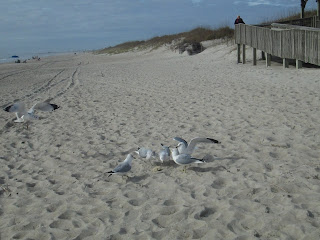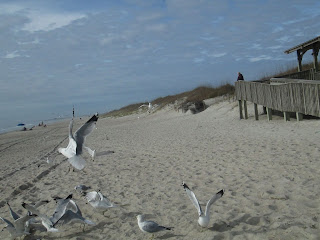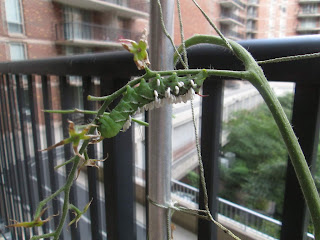I'm happy to report that my third semester of grad school is finished! That makes me 60% of the way done! Yay! I'm a lot less excited to report that my fourth semester starts today (with an evening class...grrr), but on the other hand, I have to start it in order to finish it.
Unlike
first and
second semesters, third semester was relatively chill. This is largely because it was broken into blocks, with two blocks of classes and one block of internship. This meant that I wasn't having to juggle classes with clinic responsibilities. Also, to be completely honest, my internship supervisor was way more pleasant and reasonable than some of the clinical supervisors I had during my first two semesters. That probably doesn't seem like a nice thing to say, but it's true, and it had a huge impact on my experience.
The one complaint I have about third semester is that I got a B- in a class and will have to retake it this fall (on top of my other classes and my fall internship). More on that in a moment, but this allows me to segue into the main point of what I want to write about today, which is how I chose my graduate program, and how I would view the process differently if I were to do it over again. I also want to note here that "if I were to do it over again" is strictly hypothetical. I am completely fed up with school, and if my current endeavor fails (either in terms of getting a degree or launching a new career), my next plan resembles the one in the Portlandia skit
She's Making Jewelry Now.
I'm going to be deliberately vague about some details here, but when I applied to graduate programs, I applied to three, which I will refer to as University A, University B, and University C. I told myself when I applied that I would let cost be the deciding factor if I received more than one acceptance. In the end, University A accepted me without any funding, but with the idea that departmental funding
might open up or that I could look for my own source of funding within the university. University B accepted me and verbally offered me a funding package, but with no written documentation before I needed to make a decision. University C waitlisted me. University C has significantly higher tuition than either University A or University B anyway, so I ruled it out.
On paper, I was a much better fit for University A than University B, and truthfully, I had always envisioned going to University A. The interesting thing about University B was that it has an "extra" component to its program that would enable me to learn a skill I had thought would be interesting to learn, but that is a "nice to know" rather than a "need to know" in our field. I was somewhat concerned that University B didn't give me written documentation of my funding package before the deadline to make a decision, but also reasoned that University A hadn't offered me anything. Plus, my contact from University B was telling me that my funding package would pay the majority of my tuition throughout my program and I wouldn't have to apply for funding every semester. Despite my reservations, I reminded myself that cost was going to be my deciding factor and chose to go to University B.
Well. Obviously, I can't speak for what my experience might have been at University A, but I can say that attending University B has been a lesson in things going wrong. The grant that was supposed to fund me throughout my program had to be returned to its sponsor due to university drama that I won't get into here. And that "extra" component that I had actually viewed as a selling point for the program? It's been nothing but a source of stress and struggle. It was in that class that I received a B- over the summer, giving me an extra burden this fall. All for something I don't need to know and am unlikely to use professionally. All of this leads me to how I would think about grad programs if I were to do this again:
1. Consider funding, but think of it in a more nuanced way. There is a wonderful expression in Arabic that translates to "He married the monkey for its money. The money went and the monkey remained a monkey." I thought about this expression a lot in the months after the grant that was supposed to fund me was returned. In the end, one thing I'm grateful for is that the university decided to provide a substantial portion of what I was initially offered under the grant. However, it took many months for this to come fruition, giving me a lot of time to feel upset and worried about how much tuition money I might be on the hook for. Since bad things sometimes happen with grants, if I were to do it over, I would consider how I would feel about the university if the grant fell through. Would I still feel okay about my choice of the university, or would I feel like I should have gone elsewhere? Also, I would consider secondary funding options. University B is small and fairly under-resourced, and there were few additional options for funding. University A is much larger and would have had more opportunities.
2. Think carefully about anything "extra," even if it seems interesting. Even if the "extra" component of my program came more easily to me, it's still another demand on my time. My advice to anyone at this point is that if you have anything in your grad program beyond classes (clinical components, teaching, research responsibilities, etc.), you have no time for anything "extra" and "extra" things you have to do will just make you unhappy. Stick with the basics of what you need to do and worry about learning extra skills later.
3. Never trust anyone else to think realistically. I had wondered what it would be like to take regular academic classes, the "extra" classes in my program, and have clinic responsibilities. But I decided that it must be possible to get all this stuff done because surely there was some adult in charge thinking realistically, right? Nope. If your program responsibilities sound like too much, they probably are, and the "adult" in charge probably thinks you're going to give up eating or sleeping to get stuff done. In my case, I've had to cut corners, mostly meaning that I do very little of the assigned reading for any class. Obviously, this is far from ideal from a learning perspective.
In the end, I'm hoping that once I graduate, all of this stuff will be water under the bridge. But it is painful to think that decisions I made in selecting a program may have made the journey more difficult.











